by Ben Potter
When considering the origins of Western philosophy there is a clear, almost indisputable holy trinity which gave birth to a dynasty of thought that is still with us to this day.
Whilst Socrates was certainly the father and Plato undeniably the son, it was Aristotle who exuded a ‘wholly’ spirit.
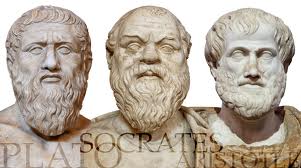
He was complete and comprehensive in the sense that, unlike his forerunners, he was no mere philosopher, but also wrote extensively on physics, poetry, theatre, music, rhetoric, linguistics, politics, biology and zoology.
He was, more than any other individual, responsible for shaping the European mind; and by extension, the minds of those in the Americas and Antipodes.
Indeed, it is impossible to deny that Aristotle gave the world an academic cornucopia that was so varied and detailed that some of his assertions were only finally being corroborated, or in fact refuted, in the 19th century, over 2000 years after his death.
Of the trinity only Aristotle, unlike Socrates and Plato, was not an Athenian. His association with Athens only began in his 18th year when he enrolled as a student at Plato’s Academy.
However, it is difficult to accurately speculate about his education prior to this.
His father was a physician at the court of King Amyntas II of Macedonia, making it likely that Aristotle, between his birth in 384 BC and his migration to Athens in 367 BC, would have spent some part of his childhood in these auspicious circles.
Also, it’s hard to imagine he was quite so precocious that he would have been able to slot so neatly into life at Plato’s Academy without at least some degree of formal education.
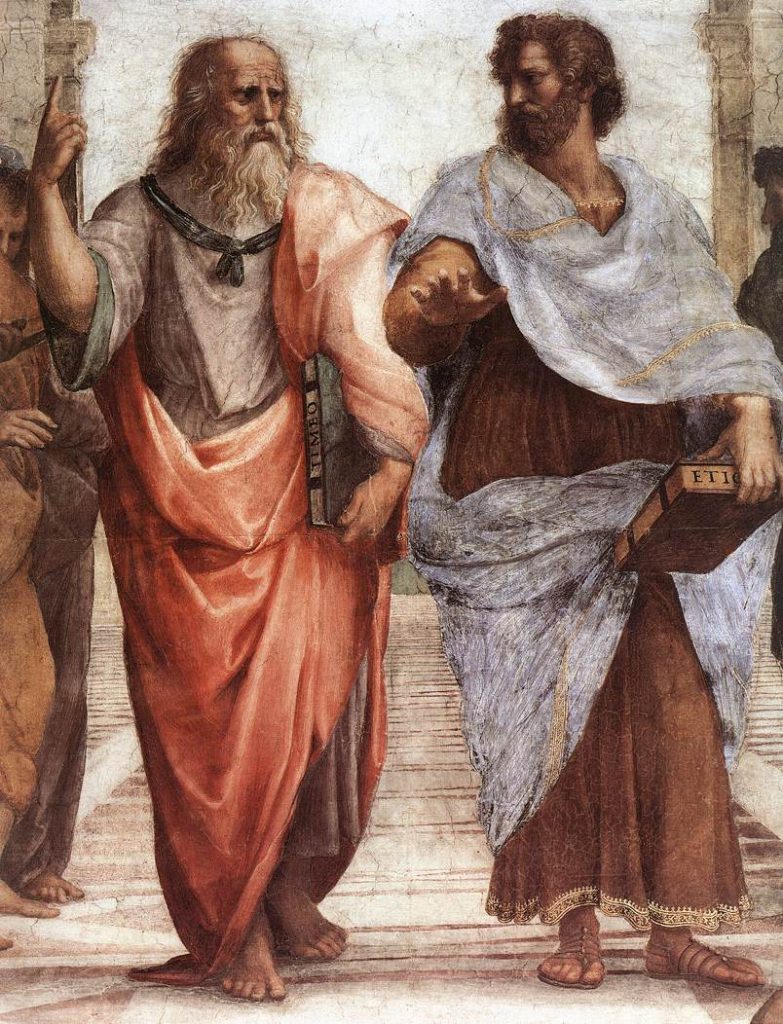
Regardless of his level of ignorance or brilliance when he entered the Academy, over the next 20 years he managed to establish himself as Plato’s protégée; learning from, but by no means kowtowing to, the elder thinker.
Much has been made of Aristotle’s departure from Plato, with some saying that the younger man rebelled against or even betrayed his tutor with the evolution of his philosophy. However, there is too much consensus and similarity between them to be quite so dramatic; evolution is a far more appropriate term than rebellion.
Indeed, Aristotle only left the Academy when its founder died in 347 BC and the reins of power were transferred to Plato’s nephew, Speusippus.
But why did Aristotle leave?
Was he unhappy at the direction in which Speusippus was taking the Academy? Was he irked by being overlooked for the top job? Or was his concern the amount of anti-Macedonian sentiment rising up in the city which was lazily misdirected toward him, despite the fact that there was nothing to suggest that Aristotle was anything other than a loyal Athenian citizen?
Whatever the reason, Aristotle decided that, for now, a hiatus from Athens would serve his interests best.
And so he made his way to Assos, due south of the traditional site of Troy. There, under the protection of a former Academy classmate, the slave-turned-tyrant Hermias, he established his own school and married Hermias’ (presumably dentally challenged) daughter.
However if Assos was where Aristotle cut his teeth as an educator, it was on Lesbos, where he moved in 345 BC, that he had the opportunity to examine and chronicle the flora and fauna of the island and surrounding sea; pioneering classification by genus and specie, and attempting to explain the very nature of each organism.
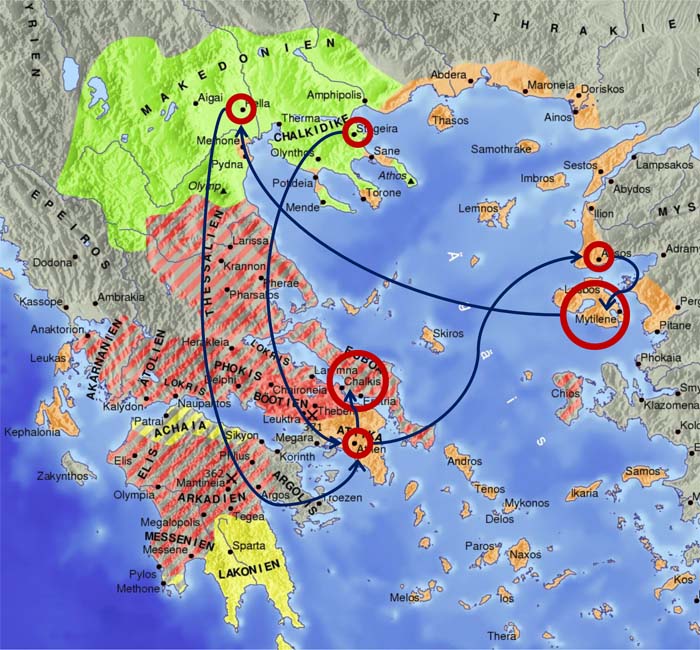
Map of Aristotle’s Life
He did this in an impressively academic manner; not content merely to observe, but also to understand the benefit of logging changes.
Aristotle was not quite ready for a return to Athens when he opted to terminate his studies in natural history with the Lesbians. Instead he took a more circuitous route and retrod the ground he walked as a child; following in his father’s footsteps as an employee at the Macedonian court.
Though not like his father as a medic, but a tutor and, as chaos theorists would have us believe, one that may have seriously altered the course of history… as the pupil he taught was none other than Alexander the Great.
However, some questioned Aristotle’s motives for taking up the post.
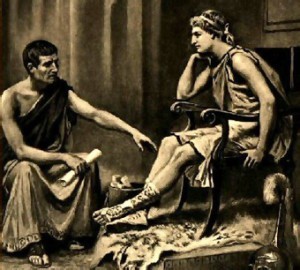
Was he tempted by the glamour of the position? By the riches it must surely have brought? Was it because Alexander’s father, King Philip II had the power to liberate and rebuild Aristotle’s home town of Stageira?
Well… we could potentially answer ‘yes’ to all of these questions. However, if he was following the teachings of his mentor Plato, then Aristotle would have had no choice but to tutor the young prince. He would have seen it as his duty to make Alexander not merely Great, but a great philosopher king.
Aristotle did what he could with Alexander, but perhaps did not have sufficient classroom time as the young man was actively involved in his father’s government from the age of 16. Thus, when Alexander came to the throne in earnest (still at the tender age of 20), Aristotle had long since become superfluous.
With his globe-trotting days behind him, and his attempts to philosophise with the soon-to-be most famous man in the world not wholly successful, Aristotle decided that the centre of the cultural world, Athens, was in need of fresh intellectual guidance.
However, an absence of 13 years and open collusion with Athens’ subjugators, Macedonia, hadn’t given Aristotle, described in one source as a dandy with rings on his fingers and a fashionable hair cut, the authority to walk brazenly back into the Academy and expect to be welcomed with open arms (though his flash appearance did manage to bag him a second wife).
So instead he opted to establish his own school, the Lyceum.
The school and its followers were often referred to as Peripatetics, a term derived from the Greek word ‘to walk’ and apocryphally thought to reflect Aristotle’s penchant for teaching while wandering the grounds.

The Peripatetics
Incongruously, it is quite possible there was very little altruism in Aristotle’s desire to teach. He openly admitted that knowledge and teaching were intertwined to the extent that a man could never truly understand something unless he could then impart that knowledge to another. Thus to teach was for Aristotle, first and foremost, beneficial to himself.
It’s hard to know if the Lyceum was more important as a college of research or one of individual enlightenment, but it was certainly during this period that Aristotle and his acolytes seem to have done much of the work for which he is now famous.
In addition to those texts (Poetics, Physics, Metaphysics, Nicomachean Ethics, etc), he (or his ‘interns’) also collected maps, codified the Athenian constitution, added a 5th element to those established by Empedocles, attempted to link good grammar practices to logic, and revealed the scientific principles behind the camera obscura.
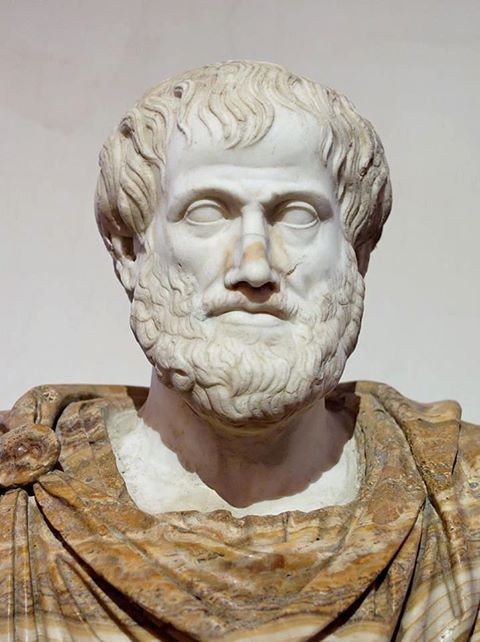
Bust of Aristotle
Significantly, though often overlooked, the school also drudged through the archives at Delphi to log the athletes who had competed in the sporting events held there whilst additionally cross-referencing them with those who had participated in Athenian dramatic festivals.
This was done not merely for the love of bureaucracy, but in an attempt to establish an accepted chronology. After all, it’s easy for us to forget that the ancient world didn’t have the luxury of a quick and easy ‘Before Christ’ or ‘Anno Domini’ way of looking at things.
And so life continued in this vein for Aristotle right up until 323 BC when Alexander the Great, fresh from conquering most of the known world decided at the age of 32 to, rather selfishly, drop dead of a tropical disease (though many prominent figures were rumoured to have poisoned him – Aristotle among them!)
The end of the Great life was the end of a chance for a worthwhile life for Aristotle, as it now became very difficult to live in Athens if one had, or was perceived to have, Macedonian sympathies. While Alexander was alive the Athenians knew that there was no chance of fighting for independence, but with his death, there was instability and a chance of revolt.
Consequently, Aristotle fled to Chalcis in the following year as, in his own words, he “would not allow Athenians to sin twice against philosophy”; a reference to the public trial and execution of Socrates in 399 BC.
For whatever reason, life on Chalcis was not sympathetic to Aristotle. After only one year he died of natural causes, aged 62.
Aristotle’s legacy flourished with barely an interruption in the AD period, but from his own time until the first century BC, Peripatetics were severely marginalized in the Greek world. A story that Aristotle’s texts were lost, hidden in a basement for centuries, before being taken to Rome in 86 BC accounts well for this gap, but is more than slightly fanciful.
There is no satisfactory explanation for Aristotle’s temporary wane in popularity, but we can say with some authority that when it waxed again it did so with dramatic virulence.
Dante dubbed him ‘the master of those that know’, whilst Thomas Aquinas simply called him ‘the philosopher’.
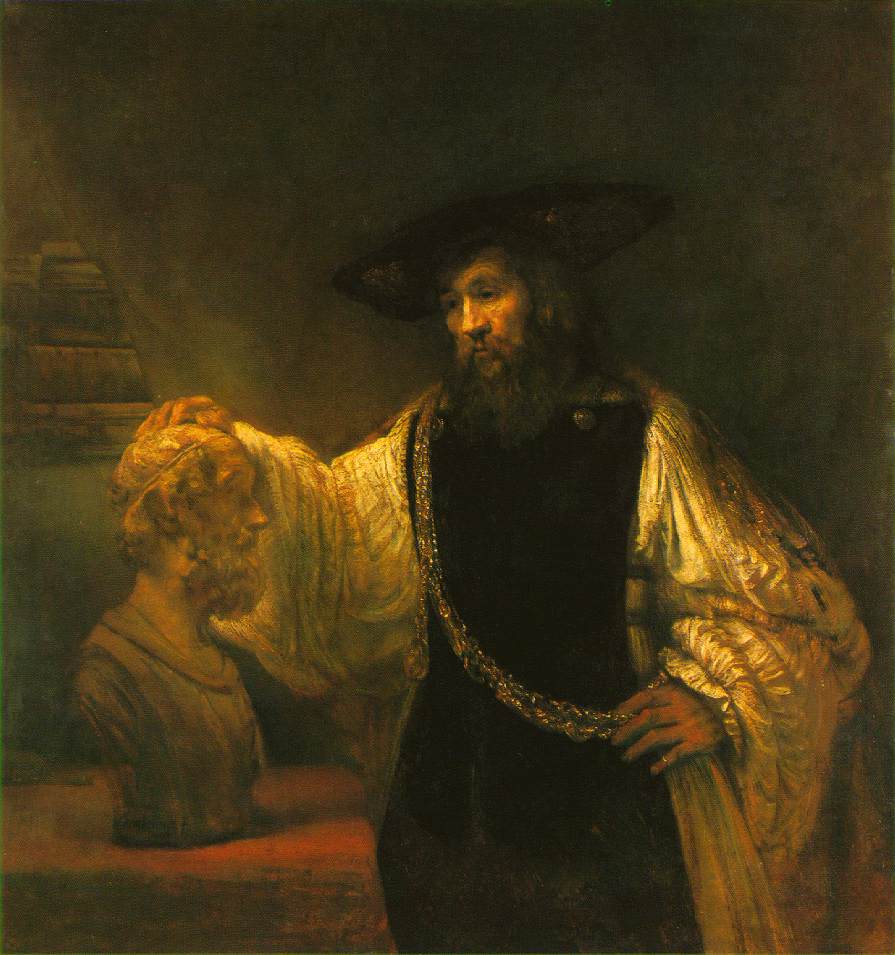
Aristotle and the bust of Homer by Rembrant
His influence was not restricted to the Latin world, he was also respected by Jewish scholars of the middle-ages while their Islamic counterparts referred to him as ‘the first teacher’.
He is said to have had a mind which was “ordered, balanced and stunningly capacious”. Indeed, some suspect that he may have been the last man in existence who knew all the information that it was possible (in his own time) to learn.
There is almost limitless choice from which to choose some fine words of Aristotle’s to leave you to mull over. However, as he was a lecturer far more than he was a writer, his words should ideally be heard and not read. So read the following inspirational thoughts aloud (unless you’re on a crowded train or alone in a cafe – Aristotle didn’t directly advocate looking like a loony) and try to hear, through the echoes of time, the buzzing thought processes of a man who was limitless in his own ability to think:
“We must not listen to those who urge us to think human thoughts since we are human, and mortal thoughts since we are mortal; rather, we should as far as possible immortalize ourselves and do all we can to live by the finest element in us – for if it is small in bulk, it is far greater than anything else in power and worth”.









One comment
What is the offhand comment about Hermias’ daughter being “dentally challenged” referring to?
Trackbacks
Our apologies, you must be logged in to post a comment.